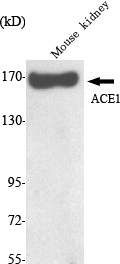ACE1 Monoclonal Antibody
- Catalog No.:YM1002
- Applications:WB
- Reactivity:Human;Mouse;Rat;Bovine
- Target:
- ACE
- Fields:
- >>Renin-angiotensin system;>>Renin secretion;>>Chagas disease;>>Coronavirus disease - COVID-19;>>Hypertrophic cardiomyopathy;>>Diabetic cardiomyopathy
- Gene Name:
- ACE
- Protein Name:
- Angiotensin-converting enzyme
- Human Gene Id:
- 1636
- Human Swiss Prot No:
- P12821
- Mouse Gene Id:
- 11421
- Mouse Swiss Prot No:
- P09470
- Rat Gene Id:
- 24310
- Rat Swiss Prot No:
- P47820
- Immunogen:
- Purified recombinant human ACE1 (N-terminus) protein fragments expressed in E.coli.
- Specificity:
- ACE1 Monoclonal Antibody detects endogenous levels of ACE1 protein.
- Formulation:
- Liquid in PBS containing 50% glycerol, 0.5% BSA and 0.02% sodium azide.
- Source:
- Monoclonal, Mouse
- Dilution:
- WB 1:1000 - 1:2000. Not yet tested in other applications.
- Purification:
- Affinity purification
- Concentration:
- 1 mg/ml
- Storage Stability:
- -15°C to -25°C/1 year(Do not lower than -25°C)
- Other Name:
- ACE;DCP;DCP1;Angiotensin-converting enzyme;ACE;Dipeptidyl carboxypeptidase I;Kininase II;CD antigen CD143
- Molecular Weight(Da):
- 150kD
- Background:
- This gene encodes an enzyme involved in catalyzing the conversion of angiotensin I into a physiologically active peptide angiotensin II. Angiotensin II is a potent vasopressor and aldosterone-stimulating peptide that controls blood pressure and fluid-electrolyte balance. This enzyme plays a key role in the renin-angiotensin system. Many studies have associated the presence or absence of a 287 bp Alu repeat element in this gene with the levels of circulating enzyme or cardiovascular pathophysiologies. Multiple alternatively spliced transcript variants encoding different isoforms have been identified, and two most abundant spliced variants encode the somatic form and the testicular form, respectively, that are equally active. [provided by RefSeq, May 2010],
- Function:
- catalytic activity:Release of a C-terminal dipeptide, oligopeptide-|-Xaa-Yaa, when Xaa is not Pro, and Yaa is neither Asp nor Glu. Thus, conversion of angiotensin I to angiotensin II, with increase in vasoconstrictor activity, but no action on angiotensin II.,cofactor:Binds 2 zinc ions per subunit. The Testis-specific isoform only binds 1 zinc ion per subunit.,cofactor:Binds 3 chloride ions per subunit.,disease:Defects in ACE are a cause of renal tubular dysgenesis (RTD) [MIM:267430]. RTD is an autosomal recessive severe disorder of renal tubular development characterized by persistent fetal anuria and perinatal death, probably due to pulmonary hypoplasia from early-onset oligohydramnios (the Potter phenotype).,disease:Genetic variations in ACE could influence susceptibility to diabetic nephropathy [MIM:612624]; also called susceptibility to microvascular complications of diabetes type 3
- Subcellular Location:
- [Angiotensin-converting enzyme, soluble form]: Secreted.; Cell membrane; Single-pass type I membrane protein. Cytoplasm . Detected in both cell membrane and cytoplasm in neurons. .
- Expression:
- Ubiquitously expressed, with highest levels in lung, kidney, heart, gastrointestinal system and prostate. Isoform Testis-specific is expressed in spermatocytes and adult testis.
- June 19-2018
- WESTERN IMMUNOBLOTTING PROTOCOL
- June 19-2018
- IMMUNOHISTOCHEMISTRY-PARAFFIN PROTOCOL
- June 19-2018
- IMMUNOFLUORESCENCE PROTOCOL
- September 08-2020
- FLOW-CYTOMEYRT-PROTOCOL
- May 20-2022
- Cell-Based ELISA│解您多样本WB检测之困扰
- July 13-2018
- CELL-BASED-ELISA-PROTOCOL-FOR-ACETYL-PROTEIN
- July 13-2018
- CELL-BASED-ELISA-PROTOCOL-FOR-PHOSPHO-PROTEIN
- July 13-2018
- Antibody-FAQs
- Products Images

- Western Blot analysis using ACE1 Monoclonal Antibody against mouse kidney lysate.



